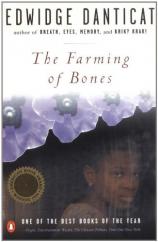Reading Group Guide
Discussion Questions
The Farming of Bones

1. What is the significance of the passage from Judges that opens the novel?
2. After Amabelle births the two babies for Señora Valencia, Dr. Javier says to her, "Many of us start out as twins in the belly and do away with the other." Does this foreshadow what will come later in the novel? How? Did Dr. Javier know that what he was saying had a deeper meaning? What about Amabelle?
3.As Pico races in his car to see his newborn twins, he hits and kills Joël, a friend of Sebastien's. While Pico and his father-in-law Papi insist that it was an accident, Sebastien and Yves are convinced that it is the beginning of the slaughter of the Haitians. What do you think? What does Amabelle think?
4.Is the death of Señora Valencia's baby boy just a coincidence, or is it an example of "an eye for an eye, a tooth for a tooth"?
5. Amabelle's parents drown during a hurricane, as did Sebastien's father, and in the 1937 slaughter, many Haitians were murdered on the bed of the river dividing the Dominican Republic and Haiti. Discuss the many functions of water in the novel, healing as well as destructive.
6. Do you think that Amabelle knew that the massacre was coming, or was she truly naive about the impending tide of events?
7. In many ways, The Farming of Bones is a meditation on survival. Each character in the novel—Amabelle, Sebastien, Father Romain, Man Denise, Man Rapadou, just to name a few—have different methods of survival. Can you discuss these? Are there any characters in particular that have survived with a better quality of life than others? What does it mean to survive?
8. Were Amabelle's dream sequences an effective narrative technique? Why or why not? Did they give you more insight into her character? Which ones did you find to be the most powerful?
9. How did you feel about Amabelle's relationship with Señora Valencia? Was it believable? Do you think that Señora Valencia would have been strong enough to protect Amabelle if she had stayed during the massacre? Were you surprised when Amabelle returned to visit her at the end of the novel?
10. Throughout The Farming of Bones—starting with the title—words are given many shades of meaning. What are some examples of this? Discuss the significance of "parsley" in the novel.
11. "Famous men never die, it is only those nameless and faceless that vanish like smoke into the early morning air." Why is this sentence so central to the theme of the novel?
12. "Unclothed, I slipped into the current. . . I looked to my dreams for softness, for a gentler embrace, for relief of the mudslides and blood bubbling out of the riverbed, where it is said the dead add their tears to the river flow." This is from the last page of the book. What is happening here? What lies ahead for Amabelle?
The Farming of Bones
- Publication Date: September 1, 1999
- Paperback: 312 pages
- Publisher: Penguin (Non-Classics)
- ISBN-10: 0140280499
- ISBN-13: 9780140280494








